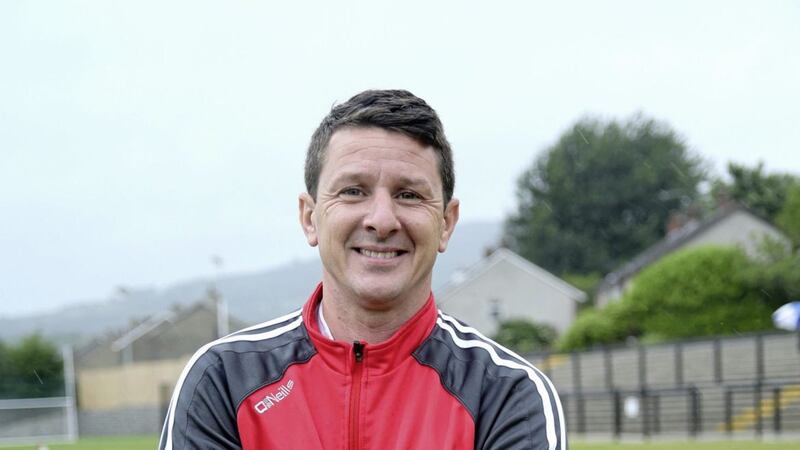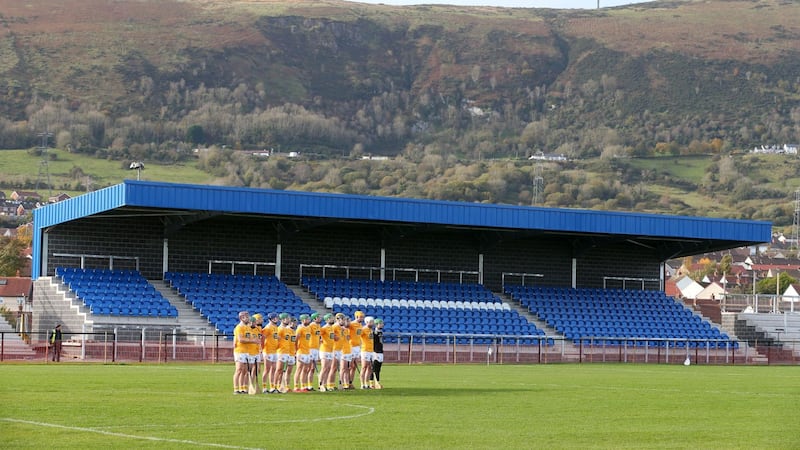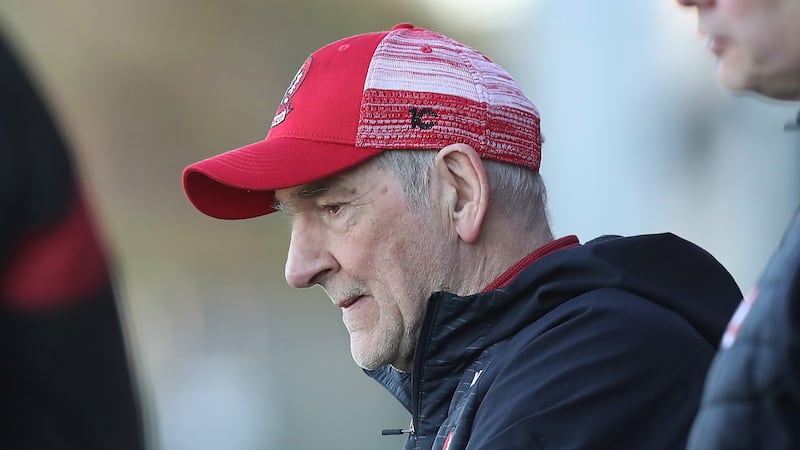The ‘Gaelfast’ project was launched earlier this year with the GAA committing £1m over the next five years in a bid to reinvigorate Gaelic Games in Belfast, Ireland’s second city. St Paul’s, Belfast man and high-ranking Sport NI official Dr Paul Donnelly netted the all-important Regeneration Manager post and tells Brendan Crossan he is looking forward to the challenge and sees a bright future for his native city…
Brendan Crossan: Tell me about your sporting background.
Paul Donnelly: I’ve been involved in Gaelic Games since I was nine-years-of-age. We moved to Dublin when I was two-and-a-half and we made our way back to Belfast when I was 11.
I played for a team called Crumlin GAA and I always recall the story when I got a whack on the hand but I kept chasing after the ball, and one of the Christian brothers at the school said to my mum: ‘This kid’s going to be a good hurler’ because when you get a smack on the hand or on the leg a kid will maybe try a different sport…
So my first introduction to Gaelic Games was in Dublin. It was around ’83 or ’84 we came back to Belfast and I went to CBS on the Glen Road and De La Salle and I played for St Paul’s – hurling and football and a bit of handball…
BC: What drew you to administrative roles in the GAA?
PD: Well, I’ve been coaching at St Paul’s from U12, U14 right through to U21. I’ve never taken any senior teams. I have to say two people influenced me greatly in terms of my decision to become involved in administration.
One was Joe McCartan, ex-chairman and ex-secretary of St Paul’s. I just saw the amount of hours he put in. It was a selfless role and he was an inspirational leader. The second person was Jim Nelson.
Jim coached me at senior hurling at St Paul’s and at county. He was juvenile chair for a period of time and he brought me in as secretary. I then took over the chair from him and then Kevin Gamble came in and supported me. I progressed as secretary of St Paul’s.
I was secretary for five years, up to 2015, and am now St Paul’s chairman. I chaired a committee to help organise our 75th anniversary celebrations in 2016 and I came back in as chairman the following year…
But I do have to step down from the chairman’s role. It’s the right thing to do. There could be the perception that if a club chairman is involved that there maybe a bias towards St Paul’s, which would never be the case.
I’m a GAA man first and foremost and my role is to ensure games are developed and embraced across the city.
BC: What’s your professional background?
PD: My first job was in ’98. I worked as a community sports development officer in the upper Springfield area of west Belfast. My main purpose was to increase participation in sports activity and using sport as a tool for social change.
In 2002, I went for a post in Sport NI as a community sport manager.
It was taking the role I had in upper Springfield and rolling that out across the north. That brought me up to 2007 where I’ve been Policy, Planning and Research manager with Sport NI.
As the title suggests, it revolves around policy and strategy and undertaking research to ensure we had a strong evidence base by which we could make decisions.
And this role [‘Gaelfast’ Regeneration Manager] is going to be no different. There is no point taking decisions on the basis of hearsay or on a hunch. Let’s undertake some meaningful research and consultation with those who are likely to be impacted by the project and come up with a vision, a set values and a way of working that people can buy into.
Education-wise, I studied Applied Psychology and a Masters in Sport, Exercise and Leisure at University of Ulster, and then a PhD in Sport, Physical Activity and Health and that was through Sheffield-Hallam University, part-time between 2007 and 2013.
BC: What was your thoughts when this ‘Gaelfast’ post came up because from the outside looking in, it’s like standing at the foot of Everest and not realising how big the mountain is?
PD: Well, all those who managed to scale Everest were all part of a team, and that team had a plan. They wanted to be on top of Everest, and this is no different.
Yes, I will lead the project but I can only do that with a team that is uniquely up for the challenge, who has knowledge, skills and understanding of it. And, more importantly, there’s overwhelming support around us to make it happen.
The team that went to Everest had a team that funded them, supported them, encouraged them – all the things that you need if you’re going to achieve something. It is a challenge.
The team behind the team is critical. And Belfast sits at the foot of its own mountains. We’re a city well used to overcoming challenges. That spirit and tenacity is what it’s going to take and that’s what gives me confidence in leading this challenge.
BC: Was there an emotional pull to this job?
PD: There was, being a Gael, being an Antrim man, a Belfast man and being involved in Gaelic Games in my own club for 25 years or more.
I think Belfast needs support, it needs leadership and direction in order to drive Gaelic Games in the city.
I think we need to go in to provide something that is equal to and better than what’s being offered to schools [by other sports]. The early conversations that I’ve already had with principals, vice principals and teachers within schools in Belfast, they really want to embrace it.
But we need a team of people around us and we need the support of the 20 clubs in Belfast, including the two Co Down-based clubs.
There are also another 27 clubs in Antrim that need to be behind this, divisional boards need to be behind this. It can’t be seen as a project that is operating in isolation from everything else.
It needs to be embedded, ingrained in the thinking of where Antrim needs to be in the next five to 10 years.
BC: Is an urban centre more difficult to revive?
PD: There are just different challenges. People have made references to Dublin’s revival – but Belfast is different. We have different social, economic and cultural issues to deal with…
For instance, when you look across many clubs at U16 and minor – that can be a difficult age bracket with exams and other activities that a young girl or boy may want to get involved in. So we need to provide opportunities that keep them involved.
Part of my job is trying to come up with innovative ways of supporting clubs in trying to keep those 16/17-year-olds. You could try leadership initiatives to keep them involved and for them to become leaders within their own club.
BC: The participation rates in [traditional] primary schools in Belfast are something like six per cent.
PD: Over the next six to nine months we will undertake research to have a robust baseline position in terms of the primary and post-primary school children that are involved in our games.
BC: What other posts will be created for this project?
PD: An Urban Development manager is one of the posts and then there is a project co-ordinator and there will be four or five Urban Development officers. Over the next two months we will have progressed recruitment processes for all of the posts.
BC: Some might regard the GAA’s £1m ‘Gaelfast’ investment over five year as quite tentative. What are your thoughts on their financial commitment? I know there are other bodies assisting with this scheme...
PD: It’s a reasonable amount of money for any investor and we need to demonstrate as a county to use the money for the purpose it was provided, make an impact and promote the games in the city and try to get that Antrim brand back on the table.
I see it as an initial investment and I see it being used as trying to draw additional investment from other funders, whether that be government departments or related agencies.
Funders and others are investing their money in the project. I’m investing myself. Five years is a good start. Let’s see what can be achieved. My philosophy is always positive. With vision, determination and a shared effort, anything is possible.
BC: How much do you think the conflict here has held back Gaelic Games in the city?
PD: It has held back the potential of Belfast. I don’t think that can ever be underestimated and that is one of the significant differences from other urban centres in Ireland.
However, I don’t think anyone has tried to quantify what adverse impact conflict has had. But some clubs suffered terribly, with club members killed and injured. There have also been attitudes towards Gaelic Games that hindered progress.
But I’m encouraged by the evidence of change. Belfast City Council reviewed its pitch provision and began investing rates in enhancing facility provision for Gaelic Games and other sports in the city.
Arlene Foster, the leader of the DUP, went to the Ulster final. These are signs of things changing. I believe Gaelic Games has a potential to engage and unify people in ways that have far-reaching benefits for the city of Belfast, not just in sport but socially and economically as well.
One of the opportunities in this project is the potential to engage non-traditional schools, non-traditional areas, non-traditional people in the project.
My first post in upper Springfield was funded by the Community Relations Council and I found sport a brilliant catalyst for people from difference backgrounds to come together. Belfast is a changing city. I think Gaelic Games can contribute to that change a in very positive way and help the citizens of this city share and learn together.
BC: Is a functioning Stormont integral to this project?
PD: Yes, it is integral to the project in terms of ensuring there is a level of sustainability. I’m a big supporter of devolved government; I think we should be making decisions for ourselves and we need to get it up and running as quickly as possible, generally.
But specific to this project would be Casement Park. Casement Park would need some big decisions in and around the end of summer and we need an effective assembly up and running to make decisions around that.
BC: Do you see ‘Gaelfast’ and Casement Park directly linked?
PD: Completely linked because you’re talking about an Antrim brand, and part of that is having a home. Antrim need a home and our home is Casement Park. I played on pitches the length and breadth of Ireland, including Croke Park, and the best pitch I ever played on was Casement Park.
I have to say, every time I drive by it with my kids or with St Paul’s U14s it breaks my heart to see the state it’s in.
In terms of how the ‘Gaelfast’ project impacts on Casement Park, how good would it be for primary school and post-primary school kids to come to Casement Park and be part of the participation initiative and watch our ladies footballers, our senior footballers, or hurlers playing in Casement Park.
But Casement Park is not just good for this project; It’s a vital part of the fabric of west Belfast, and the civic and cultural transformation of Belfast.
BC: This is a great opportunity for clubs but it’s also throwing the gauntlet down to them as well…
PD: There are no gauntlets to throw at anyone. This is about engagement, education and empowerment. All clubs need to know what the project is actually about and then the project has to work with and support to understand and engage them in a joint endeavour.
We need to begin by asking each and every club ‘Where do you think you are as a club?’; ‘Where do you think you need to be as a club?’; ‘How can this project support you to get there?’…
Based on my own knowledge and understanding, a one-size-fits-all approach will not work. The support will need to be tailored to the needs of the club.
BC: Are there too many clubs in west Belfast?
PD: Let’s not get ‘the cart before the horse’. The tradition and heritage of the GAA in Belfast can’t be dismissed or abandoned. There are clubs that can trace their origin back to the start of the 20th century and others which are barely 20-years-old.
That’s what has brought us to where we are. The demographics have changed significantly in the last number of years… Have levels of participation and membership changed?
I don’t know because I haven’t done that research but I would suspect that participation and membership have declined… Then again, the reason for any change is key to understanding and responding effectively.
Let’s look at our strengths and where we can grow stronger.
BC: There are several Sports Hubs around Belfast now – Cherryvale, Woodlands, Cliftonville and Sally Gardens. Facilities-wise, is the ground quite fertile for the ‘Gaelfast’ project?
PD: What makes sport happen is people. So we need to provide good quality opportunities both in the club and in the school setting for boys and girls to become involved in our games.
And when we do give them the chance to be involved let’s make sure it’s of good quality. And if it’s good quality there is the likelihood the club will hold onto them. The facilities are great but it’s more about the opportunities that are provided.
BC: Under this project, you might get clubs saying to other clubs: ‘Go away, this is our school.’
PD: Well, it’s obvious that everyone cannot be everywhere. But this project isn’t about petty rivalries or turf-wars. It’s about a joint endeavour in which everyone has a part to play. If we have the wit and the will, I’m confident we can find a balanced solution.
We need to review existing links and relationships and ask: what do schools want? What do schoolteachers need? What facilities and resources are required? If we know the answers to those questions, we’ll stand a better chance of succeeding.
BC: In five years’ time, have you a rough idea where you would see the project?
PD: One is, I’d like to see a cultural shift in how people view and engage in Gaelic Games in the city. How you measure that is a difficult thing; it’s intangible.
The second thing is, I would like to see increased participation in our games and an increased number of skilled, qualified coaches and volunteers in the city. All those things can be achieved in that period of time.








